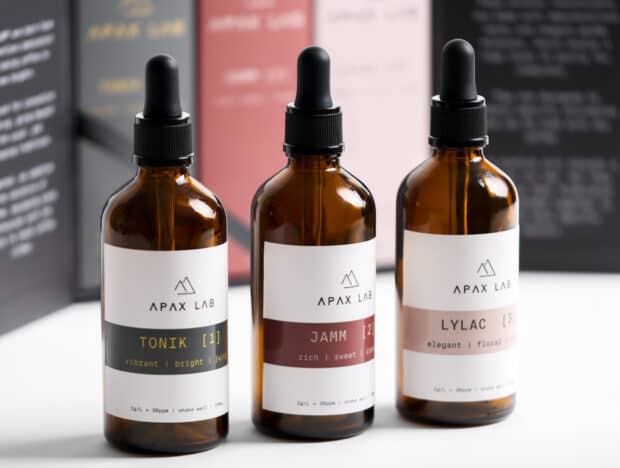[[{“value”:”
A line of mineral concentrates from an Australian startup called Apax Lab recently launched, offering three liquid formulas designed to enhance specific qualities of coffee in the cup.
Called Tonik, Jamm and Lylac, the Apax Lab formulas are available in 100-milliliter bottles for US$35 each, while sets of all three together sell for $100.
Intended for use by discerning consumers, cafe operators or even competition baristas, the solutions are added in droplets to water prior to brewing, or added to any finished brew.
Apax Lab inventor and co-founder Simon Gautherin told Daily Coffee News that while adding minerals prior to brewing leads to better diffusion and integration, adding droplets straight to a brew or shot carries similar advantages.
“Recent research indicates that minerals, in low to medium concentrations — the range used in brewing — have minimal or no impact on the extraction of acids in coffee. This means that whether minerals are added before or after brewing, the taste remains essentially the same,” Gautherin told DCN. “The different flavors we perceive when minerals are present mainly result from their interaction with our taste buds.”
This is particularly handy for tweaking the characteristics of an espresso, as the chlorides present in Apax mineral concentrates can damage stainless steel boilers, and therefore should not be added to water used inside an espresso machine.
Said Gautherin, “Adding a few drops directly into the cup just before serving espresso or a latte is somewhat akin to a chef adding a squeeze of lime or a pinch of salt to a dish before serving.”
All three Apax Lab products contain unique blends of water, magnesium, potassium, sodium and/or calcium.
Tonik leans into sodium and magnesium to heighten the vibrancy and brightness of a coffee’s perceptible acidity. Jamm amplifies sweetness and a creaminess of mouthfeel through calcium, potassium and sodium. Lylac delves into sulfates that showcase floral notes and potassium-aided silkiness.
“Lylac is a very unique profile because it doesn’t contain calcium at all,” said Gautherin. “We really went out of the box to create this profile and create something that had never been done before.”
Profiles are geared entirely towards attributes desired in the cup, regardless of the brew method, roast level or other details about the coffee.
“We don’t believe there are better profiles for specific brewing methods,” said Gautherin. “All profiles work wonders in cold brew, espresso, drip coffee but also tea, cocktails, wine, whiskey, ramen — yep, we tried it in ramen. Any beverage you can think of. We created seasoning for coffee, but the idea of seasoning in beverages already existed in the cocktail and bartending world.”
Gautherin, a Certified Q Grader, 2022 Australian AeroPress champion and “coffee excellence manager” for Melbourne-based Zest Specialty Coffee Roasters, spent the past seven years exploring the impact of minerals in water and the sensory experience of coffee.
Thousands of recipes were explored before Gautherin dialed in the three market-ready blends. The company launched in May of this year, selling out pre-orders. Online sales launched earlier this month on the company’s website.
“I believe our successful launch is due to the industry’s growing awareness of water’s crucial role in brewing and its significant impact,” said Gautherin. “We view minerals to water as seasoning is to food. Unless you’re an exceptional chef, it’s easier and more flavorful to buy high-quality spice blends than to make your own. Think of Apax Lab as the taco mix of coffee.”
Comments? Questions? News to share? Contact DCN’s editors here.
Howard Bryman Howard Bryman is the associate editor of Daily Coffee News by Roast Magazine. He is based in Portland, Oregon.
“}]]


